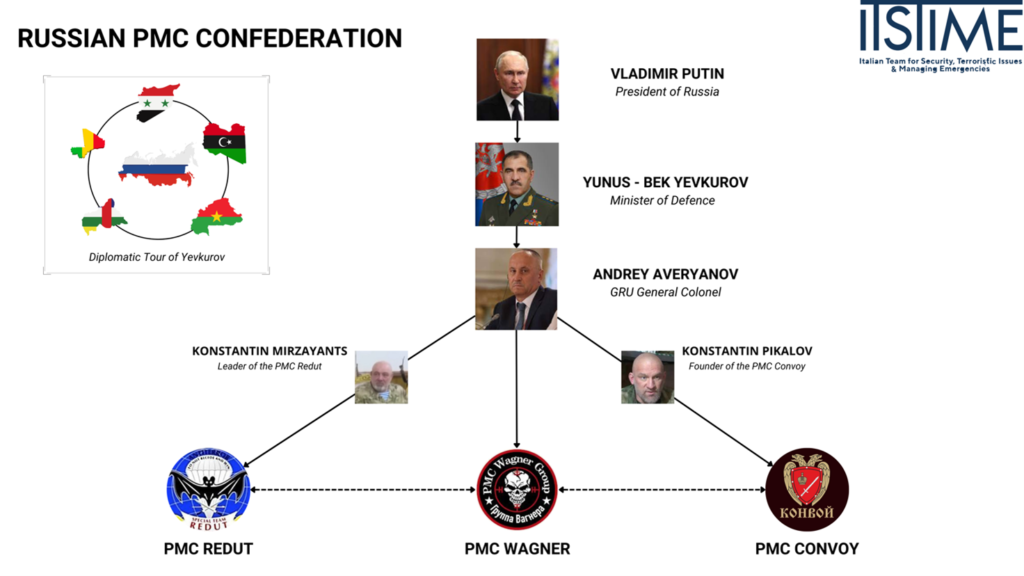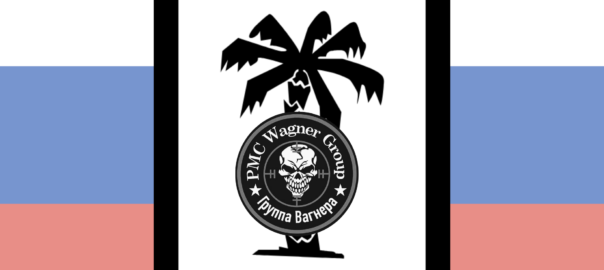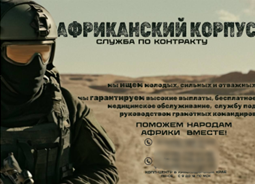Despite the death of Yevgeny Prigozhin on 23 August, PMC Wagner continued to operate in the African and Middle Eastern theatre, except for the troops that were engaged in Ukraine and are now stationed in Belarus. In recent months, however, the Ministry of Defence has undertaken a plan to restructure the PMC Wagner network, preserving its tactical-operational assets and the benefits derived.
The demise of Prigozhin as a direct consequence of the ‘March for Justice’ on 24 June 2023 represents the milestone in the PMC restructuring process initiated by the Kremlin. This process reached its climax with the recent creation of the Afrika Korps and the Duma’s approval on 12 December 2023 of the law on the National Guard’s right to have volunteer formations. As a result, under this law, the Russian National Guard will be able to include volunteers, whose participants will be subject to social benefits and guarantees applicable to military personnel. In particular, these formations will be able to be involved in carrying out defence tasks during mobilization, martial law, armed conflict, and counter-terrorism operations. The passing of this law recognizing volunteers goes hand in hand with the creation on 22 November 2023 of the Afrika Korps, a special structure of the Ministry of Defence under Yunus-Bek Yevkurov – the Deputy Minister of Defence – to carry out operations in the Middle East and Africa.
In the aftermath of the self-proclaimed ‘March for Justice’, the Russian Ministry of Defence, in close cooperation with the Kremlin, took the first steps to shape a new structure to reduce the role of the military network built by Yevgeny Prigozhin between Syria and Sub-Saharan Africa. Although the Wagner personnel previously deployed in Ukraine reside indefinitely in Belarus, mercenaries abroad continued their operations after the events of 24 June, particularly in Africa. Yet, from the Kremlin’s point of view, it was necessary to start the plan to restructure the Wagner network, but without undermining the system of alliances, agreements, and infrastructure that constitute the “Wagner Model”. As early as mid-August, shortly before Prigozhin’s death, a delegation of Russian Ministry of Defence officials, led by Yevkurov and GRU Colonel General, Andrei Averyanov, embarked on a trip to meet the heads of government and defence ministers of Syria, Libya, Burkina Faso, the Central African Republic, and Mali. The purpose of the diplomatic tour: to ensure the business continuity of the Russian mercenary forces deployed there. Given the public sympathies between Moscow and these countries, the tour by Yevkurov and Averyanov appeared to be a customary diplomatic trip to strengthen and increase the military and politico-economic relations that Russia has established with these countries in recent years. However, analysing the records of these meetings, except in Libya, the two Russian military personnel were accompanied by Konstantin Mirzayants, leader of PMC Redut, and Konstantin Pikalov, leader of PMC Convoy. The presence of Mirzayants and Pikalov suggests that the Kremlin has definitively put in place a plan to restructure the PMC Wagner network, without altering its modus operandi, or the so-called ‘Wagner model’, which has become a spearhead of Moscow’s foreign policy on the African continent.

It can be argued that the Kremlin planned the creation of a new network with military commanders, such as Yevkurov and Averyanov, linked to Putin not only by shared objectives but also by a common background. To this end, to avoid excessive centralisation of power and a new ‘Prigozhin case’, the Kremlin has given shape to a mercenary confederation, in which the forces move from Wagner to Redut, to Convoy, and vice versa, remaining strictly under the control of the GRU and the Ministry of Defence. In this context, as stated in a post on the ‘African Initative’ Telegram channel, the Afrika Korps will aim to “help the sovereign states of Africa to counter the neo-colonial influences of the West and strengthen the equal partnership between Russia and African countries” by carrying out “infrastructural operations and humanitarian assignments”.
The modalities of enlistment in the Afrika Korps are twofold and reflect the dualism between the new law passed by the Duma for volunteers and the creation of this new umbrella organisation. There is the possibility of signing a twelve-month contract as a volunteer, or a three-year military contract with the Ministry of Defence with a monthly pay of 240,000 rubles ($2669.19 at the current exchange rate). The communication, which focuses on Telegram, echoes some typical Nazi symbols. An example of this is the name itself, Afrika Korps, the name of a German army unit that was sent to Libya in 1941 during the Second World War. The palm tree, a symbol of the German Afrika Korps, is used by the new Russian unit, although it was previously adopted by PMC Wagner. Moreover, the first posts published on the Afrika Korps’ Telegram channel concerned the PMC Wagner’s actions in Africa. A communicative affinity, that between the Afrika Korps and PMC Wagner, which is present in the digital ecosystem and is reflected in the deployment in different theatres in Africa and the Middle East. A bond that confirms the restructuring plan of PMC Wagner, implemented by the Kremlin, preserving its modus operandi.


